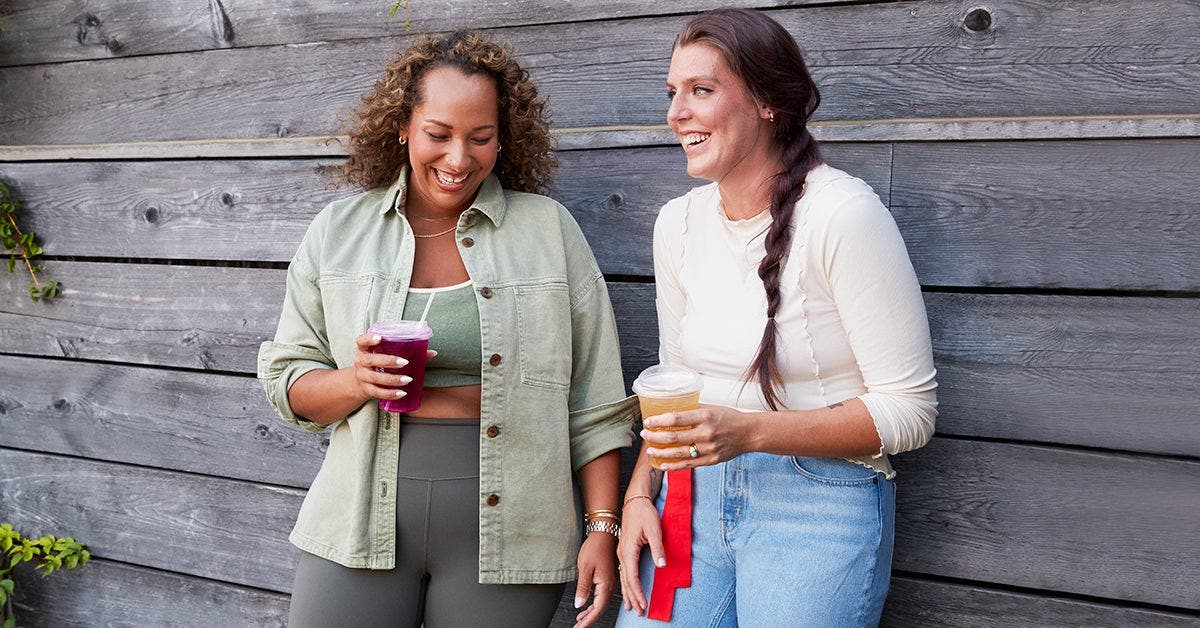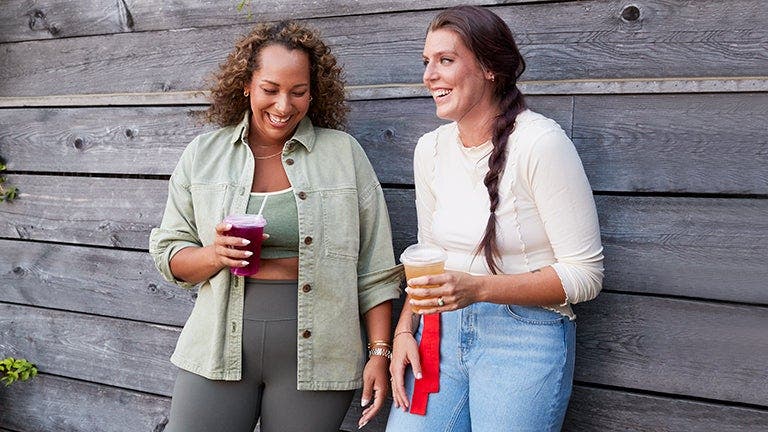Stressed? You’re not alone. Literally.


A recent poll confirmed what we already know: We are more stressed than ever, per the American Psychological Association's annual "Stress in America" report. That we feel like high-pitched tea kettles isn’t all that surprising. What is? We’ve all been brought to a boil by the same things. More than 80% of Americans identified the same stressors—like inflation—which is the highest number of people who have ever reported feeling stressed about any issue in the 15-year history of the report.
Whew. Deep breaths. Or…do we actually need more than that?
If we’re united by our existential angst, why is stress relief so often seen as a solitary pursuit? One that involves meditation, journaling, and breathing exercises. Essentially shutting the world out. Those practices have their place in your toolkit, particularly during years of on–and-off quarantine.
But doing the opposite may be the true, and even seemingly counterintuitive, solution: being social. Research shows that social support—friends, family, coworkers, etc.—can be a powerful source of stress reduction, and therefore a buoy for overall well-being. So instead of shutting the world out, let’s explore what happens when we let the world in.
Community vs. cortisol
It starts with science. When we encounter a stressor, whether it’s the ding of your inbox or the whine of an overtired toddler, it leads to a spike of cortisol, known as the stress hormone.
If the stressors are relentless—whether it’s one big stressor (say, marital problems) or a zillion littles ones—the body can interpret this as chronic stress. According to the National Institutes of Health, chronic stress triggers stress hormones (including cortisol), which can then lead to low-grade inflammation. And that inflammation can negatively impact health in a variety of ways—that’s why everything from poor memory to heart disease has been linked with chronic stress.
Social support, however, can counteract this process by triggering the release of oxytocin, the so-called love hormone, says Elaine Paravati Harrigan, Ph.D., a social-personality psychologist and visiting assistant professor of psychology at Hamilton College in Clinton, New York. Oxytocin plays a key role in social bonds, and has been found to lower cortisol levels. Meaning: The more you tap into community, the more physiological fuel you have to fight the stress and the unwelcome side effects it can cause over time.
And it’s available to us in myriad forms—best friends and acquaintances, offline and on. “Family members, close friends, and romantic partners may be the ones that we think of most,” says Harrigan. But, she adds, even brief interactions with others can count, whether you’re talking with a barista at your local coffee shop or exchanging some texts with a former colleague.
The power of another person’s perspective
Having people in your corner helps you better cope with stress psychologically too. Imagine a source of worry, like hitting a plateau on your wellness journey. “If you have the chance to talk it through with friends before it becomes some big narrative in your mind—and you get some perspective on it and some support—then it can prevent it from getting overblown,” says Chloe Carmichael, Ph.D., a psychologist in Manhattan and author of Nervous Energy: Harness the Power of Your Anxiety.
“Sometimes when we bring our stress and fears into the light, it takes their power away,” says WeightWatchers® coach Kimberly. “Just saying them in a safe place, among our community, gives members courage to flip the script toward hope and positivity.”
Community’s impact on coping skills
Just knowing you’ve got support can help you “feel better able to handle adversity, and to frame it as a challenge instead of a threat,” says Harrigan. Say you get a brusque email from your boss. You could interpret it as them being mad at you, or you could interpret it as them being overwhelmed—and then offer to help them on that big project.
This can lead to something called positive primary appraisals, which means seeing a stressor as one you can overcome. According to Blake McKimmie, Ph.D., a social psychologist in the School of Psychology at the University of Queensland in Australia, “this promotes a more problem-oriented approach to coping, which is adaptive and more likely to be a successful way of dealing with the demanding situation.” Take weigh-ins—if you’re up a pound or two, but see that simply as a challenge to overcome, you’ll be more likely to keep taking steps forward on your wellness journey, rather than throwing in the towel.
One study in Group Processes & Intergroup Relations found that support from—and identification with—a social group led to more positive primary appraisals, better problem-solving, and satisfaction with the task at hand. McKimmie, the lead author on the study, also notes that important people in our lives influence the way we think about stressful events. “If they don’t see something as particularly stressful, then we are less likely to see it as stressful as well,” he says. Translation: A don’t-sweat-the-small-stuff attitude can be contagious.
3 ways to cultivate (more) community
Our need for social support has mushroomed just as “third places”—coined by sociologist Ray Oldenburg and referring to places where people spend time between home (first place) and work (second place)—have evaporated, from bars and restaurants to public spaces like parks and community centers. According to the American Community Survey from the U.S. Census Bureau, fewer Americans report having a favorite local place in 2022 than they did just a couple years earlier. How to counter that:
1. Find common bonds
If you’re looking to up your social support, it can help to find a group you can identify with—like other WeightWatchers members in a Workshop or on Connect, or the local run club—because it instills a sense of belonging and built-in backup, says McKimmie. This has been key for WeightWatchers member Katherine: “My Connect friends are instrumental in helping me process stress,” says the mother of three who works full-time while also homeschooling her two eldest children. “Connect is full of people on the same journey, so we can identify with each other's struggles—whereas many of our ‘real life’ people may not be able to relate.”
2. Don’t worry about size
With social networks, it’s quality over quantity. “My research has shown that the size of your group isn't actually very important to helping you feel connected and therefore less stressed,” says Harrigan, who studies the fulfillment of social needs. What matters is that you feel supported.
That said, your personality type may provide some clues as to how big (or little) of a community will make you feel most supported. If you’re more introverted, a smaller social network (of, say, your immediate family and a few tight-knit buds) might be more realistic and offer more comfort than some sprawling network.
On the other hand, “people who are more extroverted might benefit from having a very wide swath of community, friends, and people that they can constantly be bouncing things off of and interacting with,” says Carmichael.
3. Redefine connection
IRL hangs are great, but they aren’t the only ones with anti-stress advantages. According to Harrigan, the flexibility of your community—how you meet or how you connect, for instance—can help you fare better during stressful times, something that proved especially important over the pandemic. If a friend lives across the country, digitally enhanced work-arounds—from Zoom calls to out-of-the-blue texts—are fair game. “If that means switching happy hour to Zoom or making a phone call instead of visiting in person, we can still feel the benefits from that non-traditional social connection,” says Harrigan.
This is also where social networks can really come in handy. Think: your TikTok rabbit hole of fellow elder Millennials (or Gen X’ers, or boomers…) or your Connect group packed with pet parents. (Shout out to Living with Pets peeps!). Carmichael simply emphasizes the importance of using social platforms to engage—liking or commenting on a friend’s post, for example, instead of mindlessly scrolling—and getting in the game yourself. “In order to feel like part of the community, you've got to put yourself out there and share your story too,” adds Katherine, referring to Connect. “We're all living out a level of vulnerability with each other. That’s the beauty of community.”
See our sources
Deanna Pai is a freelance health and lifestyle journalist whose work has appeared in Vogue, Cosmopolitan, Women’s Health, Self, Glamour, and more.
This article was reviewed for accuracy in April 2022 by WeightWatchers Director of Science Translation, Megan Schreier, MPH. The WW Science Team is a dedicated group of experts who ensure all our solutions are rooted in the best possible research.
